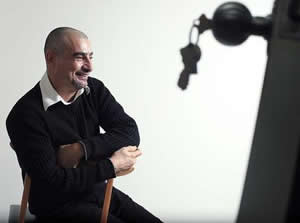Out from under U.S. HIV blacklist after 15 years of exile
Ban on HIV-positive travellers came down hard on Sergio Martinez. With it lifted, he's finally free
Jan 10 2010 - Fifteen years ago, Sergio Martinez's life came to an abrupt halt when an airport
customs agent in Los Angeles found HIV medication in his bag. It might as well have been a bomb.

"I was treated like a criminal," says Martinez, 52, now a Toronto resident. "I was immediately
put in a detention cell and then put on the first plane back to Canada. And I was told I could no longer enter the United States."
Until that day in 1994, Martinez had been a green card resident of L.A. for 15 years. He worked as a vice-president
of a film studio, travelling often to Montreal to visit family. He gave little thought to the ban on HIV-positive foreigners entering the U.S.
When the 1987 ban caught up to Martinez, he was deported without the chance of packing up his life. Friends had to crate
his personal belongings and ship them to Canada.
"It was a devastating experience. My entire life was destroyed as a result of a customs official going through
my bags," says Martinez, a manager at the AIDS Committee of Toronto.
He only fully recovered last week, when the U.S. finally lifted the ban on HIV-positive foreigners.
"It's an historical moment," says Martinez, adding it ends two decades of discrimination and stigma.
Besides: "I have a partner and we want to go see some Broadway shows in New York City."
There are 57 countries that still restrict entry, length of stay or residency for people suffering with HIV,
according to the United Nations. They include China, Singapore, United Arab Emirates, Egypt, Australia, New Zealand, and Russia.
In Canada, foreigners with HIV are blocked from entering as economic immigrants if it's judged they'll place an "excessive" demand
on health or social services.
It was common for the more than 58,000 Canadians with HIV to travel to the U.S., despite the ban. Most simply didn't disclose
their status to border officials, and some lied.
"My heart was in my mouth every time I went through," Toronto resident Ron Rosenes said in a phone interview from
Miami Beach, where he travelled before Christmas to be with his American partner.
Rosenes travels to the U.S. about six times a year and has never been stopped. During the ban, he wrote articles in community
magazines on the dos and don'ts of crossing the border. He says border agents were more likely to question people who looked unwell or "very gay."
The biggest dilemma was how to hide HIV medications. Some travellers would mail them to their destination, risking they might never arrive.
Rosenes, vice-chair of the Canadian Treatment Action Council, recommended putting the pills in generic plastic containers.
Some would instead risk their lives to beat the ban.
Research conducted in 2006 among HIV-positive travellers to the U.S. - published in the journal HIV Medicine - found 11 per
cent left their drugs at home out of fear.
"Missing even a small number of doses may lead to the emergence of drug resistant strains of HIV, undermine effectiveness
of treatment and ultimately lead to treatment failure," warned a 2008 UN report.
Those caught without disclosing would, like Martinez, be blacklisted on a U.S. database. He says he was banned from the country
for several years. He then could apply for a discretionary "waiver," issued to enter the U.S. on a case-by-case basis. He never did.
Last June, 60 Canadians sponsored by the Ontario HIV Treatment Network balked at disclosing their HIV status for a special visa
to attend an HIV research conference in Washington, D.C. They feared the information would be stored and make future travel impossible. All but
three went to the conference nonetheless, choosing not to disclose, says the network's executive director, Sean Rourke.
The ban was implemented when ignorance about HIV was more the rule than the exception. Classified as a "communicable disease of
public health significance," it kept out students, tourists and refugees.
Yet "no significant evidence" exists indicating HIV-positive travellers engage in risky behaviour, according to a 2008
UN report. The risks, instead, lie within the U.S. A 2002 study published in the American Journal of Public Health found that most foreign-born
people with HIV in the U.S. had been infected after arriving in the country.
In Canada, foreign students or tourists are not required to disclose their HIV status. But immigrants are tested for the virus
before becoming permanent residents. Refugee claimants who test positive, along with children or spouses of Canadians or permanent residents,
are allowed entry.
Economic immigrants who test positive are barred if it is deemed they will cost the public health care system more than $5,100 a
year - the average cost of health care per Canadian, says John Norquay, immigration lawyer for the HIV & AIDS Legal Clinic (Ontario).
With antiretroviral treatment costing about $1,000 a month, almost all HIV-positive economic immigrants are rejected, he adds.
From January 2002 to December 2008, 3,706 would-be immigrants to Canada tested positive. Immigration officials say 90 per cent of
them were allowed in the country. All but 8 per cent fell into the categories (as refugees or children or spouses of valid immigrants) that are
exempt from the "excessive" health care standard.
Entry could be granted to economic class immigrants with HIV, Norquay says, if they can prove their medical costs would be covered
by private insurance.
Norquay sees the potential for a legal challenge based on the Charter of Rights and Freedoms.
"It's essentially discrimination on the grounds of a health condition or a disability," he says.
Martinez is well aware the battles are far from over. In the meantime, he is making plans to see the Broadway premiere of the
musical Priscilla Queen of the Desert.
"Reproduced with permission - Torstar Syndication Services"
Toronto Star
|